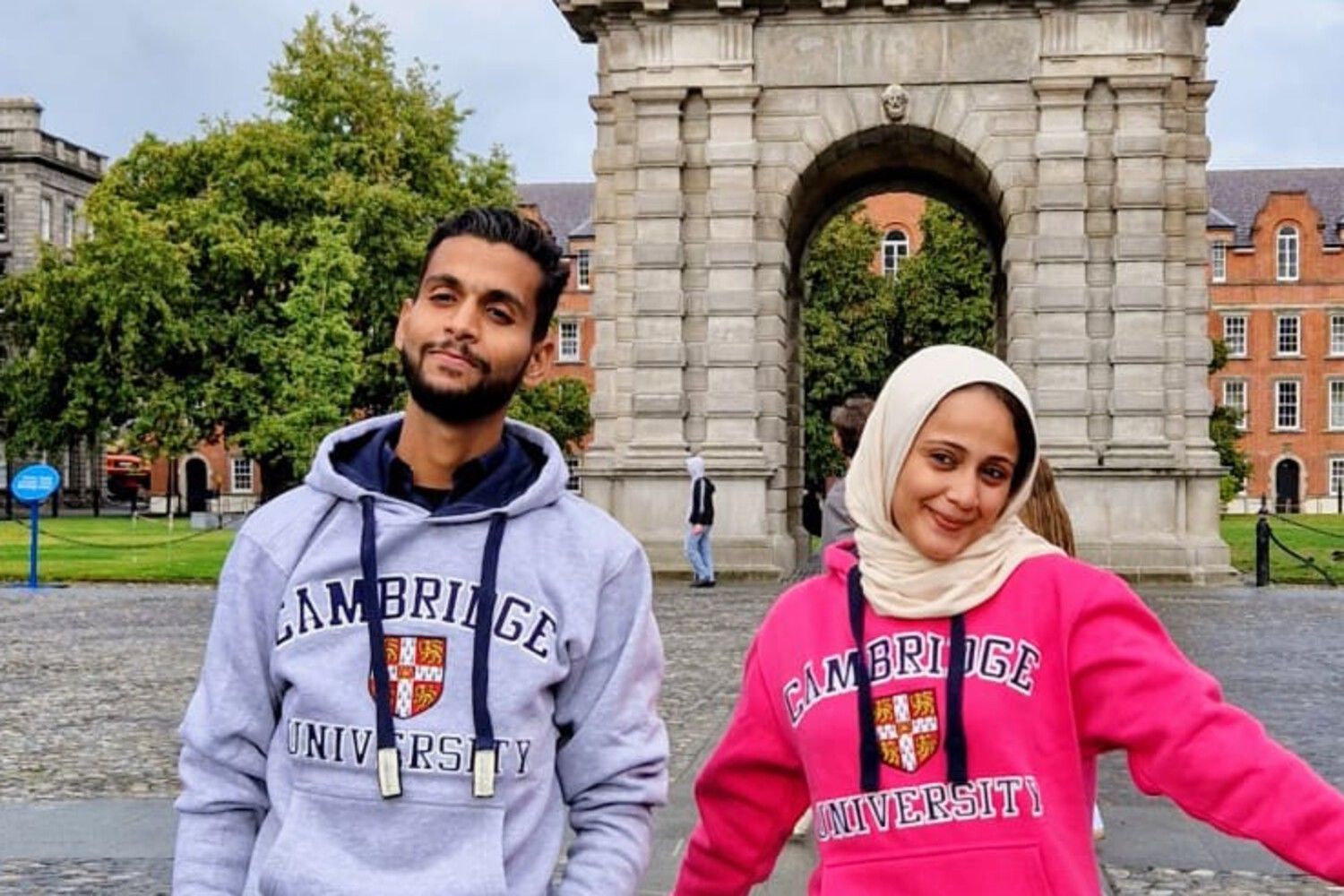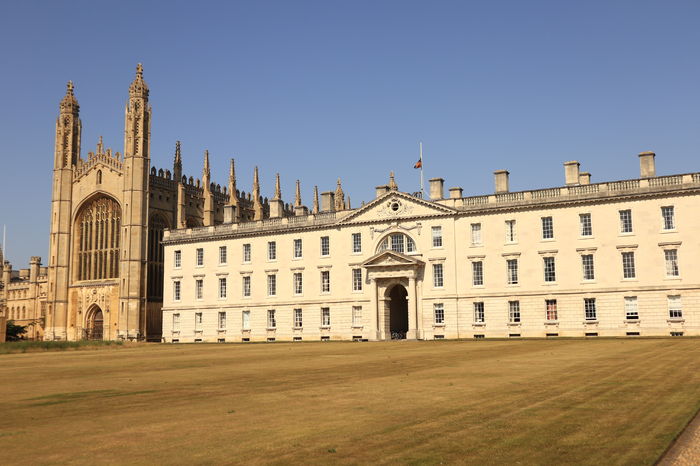Two Cambridge offer-holders trapped in Gaza were evacuated to safety by the University weeks before the UK government announced any route for Palestinian scholars, after months of behind-the-scenes work.
Malak Hani and Ahmed Abutabaq crossed into Jordan on 28 August and were flown to Dublin, following direct intervention from senior Cambridge figures and cooperation with the Irish government and Trinity College Dublin (TCD). Although both had secured highly competitive places in February, UK visa rules made it impossible for them to leave Gaza for months.
Both are now beginning a year of study at TCD before transferring to Cambridge. Malak’s scholarship to read History and Politics at Downing College has been deferred to 2026, as she begins a foundation year in Dublin, while Ahmed has started an MSc as Cambridge works to enable his postgraduate entry next year at Darwin College.
Prof Bhaskar Vira, Pro-Vice-Chancellor for Education said: “We are delighted that both Malak and Ahmed were evacuated safely out of Gaza and are grateful to our colleagues at Trinity College Dublin who worked tirelessly to facilitate this. These talented students have overcome unimaginable challenges and we wish them all the best as they embark on their studies.”
“The University and Downing College sent representatives to welcome and support them after they arrived in Dublin and give them a metaphorical ‘group hug’ from all of us at Cambridge. We look forward to seeing them here soon,” Vira continued.
Meanwhile, Dr Kamran Yunus, Director of Admissions at Downing College, stated: “The last ten months have probably brought the most thought-provoking moments in my career. Working with Malak and Ahmed has really made me realise the importance of academic institutions and their role in bridging across borders to offer bright talented students opportunities that can change their lives.”
“What the University of Cambridge has done by working with institutions such as Trinity College Dublin is part of establishing a blueprint for what academic institutions need to do, to collaborate with each other to support students in regions of conflict.”
Dr Emma Stokes, Vice President for Global Engagement at TCD, stated: “We have been delighted to welcome our latest cohort of students from Gaza and we are extremely relieved that they have been able to leave Gaza safely.”
“The students’ commitment to education and their commitment to travel at this time is absolutely remarkable and it’s been a privilege to be involved in this process. This has been an incredibly collaborative sectoral effort, working closely and positively with multiple government departments,” Stokes continued.
When Malak went to sit her Cambridge interview, she was walking two kilometres across Gaza City under evacuation orders, carrying a solar-charged battery on her back to power the WiFi router at a friend’s house.
“They were bombing everyone who was walking, so it was a warning sign that you should go on,” she told Varsity. “But I really wanted to go to the interview, I really wanted to seize this opportunity, and I went. It was a really beautiful interview – I felt like I was having a discussion with my friends, not professors. And yeah, I got in!”
Ahmed added that amid the conflict it “seemed impossible” to “apply to one of the world’s most prestigious universities […] But everything begins simply – by asking. I spent hours and days understanding every field in the application. I won’t even mention the hours I sat outside just to download one video because there was only internet in the street.”
The breakthrough in August came after months of frustration. UK immigration rules required students to provide biometric data in person, but Gaza’s visa centre has been shut due to the conflict since 2023. With border crossings sealed, the nearest centres in Egypt and Jordan were unreachable.
“It was like a loop,” Malak explained. “You cannot get a visa without leaving, and you cannot leave without a visa.”
By April this year, senior members of the University were aware of this case and over the coming months there was growing pressure from several figures across the University. This included direct appeals to Government ministers including by PVCs and heads of Colleges such as Graham Virgo (Downing) and Lord Simon Woolley (Homerton). Concurrently, there was regular contact with the Irish government and senior colleagues at TCD.
In late July there was renewed urgency and Malak’s case was publicised extensively in the media to help increase pressure on the government, with pieces in the Sunday Times, Telegraph, Channel 4 News, and BBC’s Today programme. Cambridge Students’ Union (SU) also wrote an open letter to Prime Minister Keir Starmer and senior ministers demanding “government intervention”.
“These students have obtained extraordinarily competitive offers and demonstrated huge academic potential, only to be denied the ability to take up their places by a legal technicality entirely within your control,” the letter warned. “Devastatingly, some students have already been killed while waiting for their visas to leave Gaza.”
Yet, the British government did not take action to evacuate any UK university offer-holders stuck in Gaza until September, when the then Foreign Secretary confirmed that 40 scholarship-holders would be allowed to travel with biometric checks deferred.
Weeks before, the University, along with Malak and Ahmed, decided not to wait, but to go through another route. In late August (28/08), Malak and Ahmed were evacuated to Dublin via Jordan, enabled by the Irish Government and TCD. Representatives from Cambridge and their Colleges joined Trinity staff to greet them on arrival.
Malak said: “When the opportunity came for my evacuation to Ireland, I just seized it, because it’s a matter of death or being alive. I said to myself, ‘if I manage to leave, I can just go [to Cambridge] next year’.”
Ahmed described his own relief at leaving: “My departure from Gaza through the Irish route came at exactly the right time. Honestly, what exhausted me most were the dreams I had every night before leaving Gaza: being killed or injured. I don’t know how I would have continued my life if I had been injured or lost the opportunity after all this effort.”
“I was close to death four times after receiving my unconditional offer – twice in a place called Zikim while waiting for aid trucks, once in Nitsarim, and once while trying to withdraw cash because we couldn’t buy anything without converting our money into cash. Even if I hadn’t left, I think I was very close to being killed. Honestly, what exhausted me most were the dreams I had every night before leaving Gaza: being killed or injured. I don’t know how I would have continued my life if I had been injured or lost the opportunity after all this effort,” he reflected.
For Malak, the evacuation marked the end of months of fear. “I’ve been displaced more than ten times… After a month, my house got bombed… If I go to my house now, there is no evidence of any existing building that used to be there,” she said. Her family remain in a tent in southern Gaza.
“[Before 2023], we had schools, we had hospitals, we had the basics,” she said. “Now there are no schools, no houses, and big-scale social degradation… children don’t know what compassion looks like, because they’ve never actually faced any kind of sympathy or compassion from the world.”
In July, she told the Telegraph: “I am stuck… Losing another year without education would be very hard on me… I may lose my life first.” While waiting, Malak spent these months of limbo teaching displaced children English, Arabic, and maths in makeshift classes.
In this time, Malak wrote a letter to staff and students at Cambridge who had been advocating for her thanking them for “making my Cambridge dream feel possible again”.
“Since the war began in 2023, my future has often felt like a dream dissolving in front of me,” she wrote. “I graduated high school in July 2023 as the second-highest-ranking student in the Palestinian Territories, with a GPA of 99.4%. My parents and everyone around me were proud, and I believed I was only at the beginning of a long journey full of potential.”
“However, my dreams, with the beginning of the war, began to shrink until they became all about filling – filling my stomach with flour and canned food, waiting in crowded lines to fill buckets with water, and searching for news that could fill my heart with hope instead of despair.” She added: “Only God knows how much I endured to keep my soul alive in those application essays and that interview.”
And yet she told Cambridge staff that she remained determined: “I held on with quiet resolve, determined to carve out my place in this world. And I made it, I was accepted.”
Her letter closed with a plea: “I cannot leave Gaza to join you in October unless the UK government intervenes… But your belief in me is a light I carry every day. I realize now that I am still suffering with grace, just as I always hoped I would. And I hope this suffering is not in vain… Because all I want is the chance to be tested not by graceful suffering, but by the things I love: Education. A, B, C, D, E, F… Education.”
Asked why she wants to study History and Politics, she said: “We Gazans are always represented in two ways: some people represent us as heroes; some people represent us as terrorists. We’re not heroes, we’re not terrorists – we’re just humans. We want to live a decent life. So I want to study history and politics to be the diplomat that is yelling at people and saying, ‘Hey, we’re humans! ’”
She says she is most excited by something small: “The only thing I keep thinking about is going through Trinity Lane at Cambridge, because it’s my favourite place. I don’t know why! It reminds me of one my favourite movies – Oppenheimer – and also Harry Potter, it gives me the same aesthetic.”
Her message is to other Gazan students: “I hope that every student in Gaza will just get the opportunities they deserve. They deserve schools, they deserve education, and they deserve to experience Trinity Lane.”


